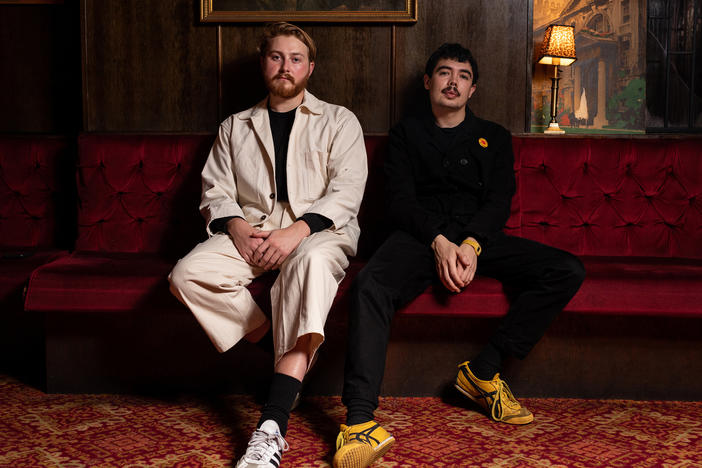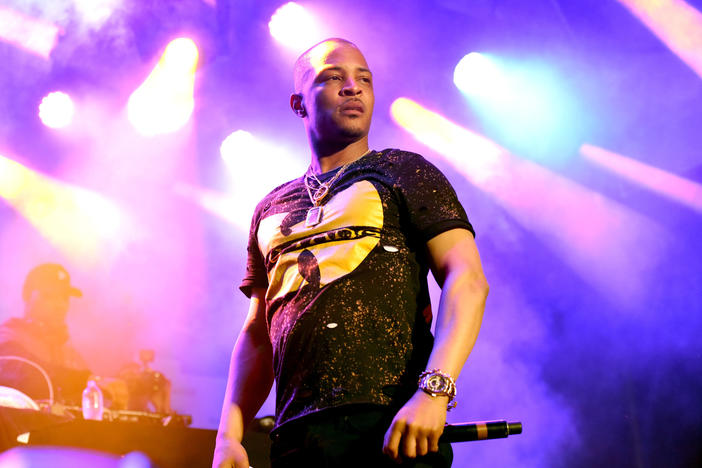Section Branding
Header Content
'Rapper's Delight': How hip-hop got its first record deal
Primary Content
Hip-hop was born at a party in 1973, but it'd be another six years until the first commercial hip-hop records. People have differing views of it, but the release of "Rapper's Delight" changed history.
Transcript
JUANA SUMMERS, HOST:
If hip-hop was born at a party in 1973, it would be another six years until we had commercial hip-hop records.
(SOUNDBITE OF SONG, "RAPPER'S DELIGHT")
THE SUGARHILL GANG: (Rapping) I said a hip, hop, the hippie, the hippie to the hip, hip, hop-a you don't stop...
SUMMERS: At the time, hip-hop happened live at parties. Nobody actually making it thought you could capture that on vinyl.
DAN CHARNAS: That's the craziest idea ever.
SUMMERS: Music historian Dan Charnas.
CHARNAS: Who would think of making a record out of people talking over records?
SUMMERS: And that song was not just the first major record. It changed the course of the movement. This week, hip-hop celebrates its 50th anniversary, and we're exploring key moments that helped define the music. Today, the story of "Rapper's Delight," which is also the story of an artist turned record producer named Sylvia Robinson.
(SOUNDBITE OF CHIC SONG, "GOOD TIMES")
SUMMERS: In 1979, her record label was facing bankruptcy when she walked into her niece's birthday party in New York City. That's where she first saw a rapper working a mic over the hit of the summer.
(SOUNDBITE OF SONG, "GOOD TIMES")
CHIC: (Singing) Good times.
SUMMERS: "Good Times" by the band Chic.
(SOUNDBITE OF SONG, "GOOD TIMES")
CHIC: (Singing) These are the good times.
CHARNAS: She turns to her sister, Diane (ph), and she says, essentially, you know, this is a sign from God. This is how the Lord is going to save me and save my company. I'm going to make a record out of this.
SUMMERS: Dan Charnas says that particular rapper didn't want to make the record. So out in the suburbs, she recruited some help.
CHARNAS: So she had her young son, Joe Jr., find a couple of his friends - three of his friends, actually - in New Jersey, where they lived, to create a rap version of "Good Times" by Chic.
SUMMERS: Those three kids, who weren't actually experienced MCs, rhymed for one long take, nearly 15 minutes. Sylvia Robinson named the group after her childhood neighborhood in Harlem. They became The Sugarhill Gang. And to everybody's surprise, this 15-minute song, "Rapper's Delight," was a hit.
(SOUNDBITE OF SONG, "RAPPER'S DELIGHT")
THE SUGARHILL GANG: (Rapping) Now what you hear is not a test. I'm rapping to the beat.
SUMMERS: Let's talk about the impact of that song with New York Times reporter Jonathan Abrams, author of "The Come Up: An Oral History Of The Rise Of Hip-Hop," and with journalist and sociology professor Oliver Wang, editor of "Classic Material: The Hip-Hop Album Guide." Hi, folks.
OLIVER WANG: Thanks for having me.
JONATHAN ABRAMS: Hey. How you doing?
SUMMERS: Hey. So y'all, broadly speaking, at this point in time, what is the general public's reaction to "Rapper's Delight"? Is it a mainstream hit immediately? Is it seen like a novelty? What are people thinking?
WANG: I think for the listening public, it initially certainly would have seemed much more like a novelty hit. You have this 15-minute single of people rapping over, you know, "Good Times" by Chic. And it wasn't until they started playing this - and then the audience response was overwhelming - that all of these lightbulbs begin - and dollar signs probably started to go up over the heads of people in radio stations and record labels to realize, oh, there is something happening here - so I think the fact that it can simultaneously be something that was both considered a novelty yet also a legitimate pop hit, which it absolutely was.
ABRAMS: I mean, that's one of the great ironies of hip-hop - right, Oliver? - that a lot of those foundational members and DJs, when this thing really started to take off commercially, they were trying to figure where they had a place in all this because it was really a group that nobody had heard of that launched this thing.
(SOUNDBITE OF SONG, "RAPPER'S DELIGHT")
THE SUGARHILL GANG: (Rapping) Gotta bang, bang the boogie to the boogie say up jump the boogie to the bang-bang...
ABRAMS: And I think the best example of that is somebody like Grandmaster Caz. Big Bank was his manager for the Cold Crush Brothers. So he knew all of Grandmaster Caz's lyrics, and a lot of them are appropriated for "Rapper's Delight."
(SOUNDBITE OF SONG, "RAPPER'S DELIGHT")
THE SUGARHILL GANG: (Rapping) Check it out. I'm the C-A-S-AN, the O-V-A and the rest is F-L-Y.
ABRAMS: But Grandmaster Caz - at that time he didn't care. It was only later that he's heard it on the radio, and he still thought it sounded lame. But then he saw how people were reacting and responding to it and saw it becoming such a big hit. By the end of that summer, you have kids able to sing it all.
SUMMERS: So if this all starts in 1979, I want to set a few other markers here. How quickly, from that point, do we start to see more rap records? When do we see rap on a major label?
ABRAMS: Well, you see Sylvia start to develop her own label, and she starts to get groups like Grandmaster Flash.
(SOUNDBITE OF GRANDMASTER FLASH AND THE FURIOUS FIVE SONG, "THE MESSAGE")
ABRAMS: Then you had other record labels in Harlem starting to bubble up. So it was very quickly where you started to see that surface.
(SOUNDBITE OF SONG, "THE MESSAGE")
GRANDMASTER FLASH AND THE FURIOUS FIVE: (Rapping) Standing on the front stoop, hanging out the window, watching all the cars go by, roaring as the breezes blow.
WANG: A lot of what you see in those early years are largely independent labels. And so I'm thinking of everything from Profile, which is where Run-D.M.C. first started a couple years down the road...
(SOUNDBITE OF SONG, "ROCK BOX")
RUN-D M C: (Rapping) Run-D.M.C.
WANG: So I think it really took a while for major labels to pay attention. But after a certain amount of time, they realized, oh, wait. This is something serious. We should get on this because this is going to make us money.
(SOUNDBITE OF SONG, "I CAN’T LIVE WITHOUT MY RADIO")
LL COOL J: (Rapping) Walking down the street to the hardcore beat while my JVC vibrates the concrete.
SUMMERS: So how does this change the sound itself? Like, what do we start to notice in what we now call the production of these records and even the rapping itself?
WANG: I think one of the big things here has to do with the evolution of music and production technology.
(SOUNDBITE OF THE SUGARHILL GANG SONG, "RAPPER'S DELIGHT")
WANG: Because the original "Rapper's Delight" is members of the Sugarhill Band, which were largely session players who had been working with Sylvia Robinson for many years...
(SOUNDBITE OF THE SUGARHILL GANG SONG, "RAPPER'S DELIGHT")
WANG: It sounds like it's sampled because a lot of them are replaying the grooves that you hear from big disco or late-era funk hits...
(SOUNDBITE OF THE SUGARHILL GANG SONG, "RAPPER'S DELIGHT")
WANG: ...But it's not sampled in terms of digitally sampled.
(SOUNDBITE OF RUN-D.M.C. SONG, "SUCKER MC'S")
WANG: Then, when drum machines become more affordable - and this would be probably around - what? - '82, '83 - this is where you begin to see this big shift in the sound of the music. So I'm thinking of something like Run-D.M.C.'s breakout single, "Sucker MC's."
(SOUNDBITE OF SONG, "SUCKER MC'S")
RUN-D M C: (Rapping) Two years ago, a friend of mine asked me to say some MC rhymes. So I said...
WANG: All you need is those two guys and their DJ on stage, and that's it.
(SOUNDBITE OF SONG, "SUCKER MC'S")
RUN-D M C: (Rapping) Took a test to become an MC.
WANG: And of course, when we get later into the '80s and '90s, even the DJ disappears. It just becomes about the rapper.
ABRAMS: Yeah. And I really think if you look at hip-hop and how it started, it was graffiti. It was lyricism. It was DJing. And I think that "Rapper's Delight" and its commercial success really fast-forwarded that eventual change because once corporate America puts, you know, two cents into anything, it's something that's going to be changed forever.
(SOUNDBITE OF SONG, "RAPPER'S DELIGHT")
THE SUGARHILL GANG: (Rapping) Singing on and and on and on, on and on like a hot party the pop the pop the pop, dibbie, dibbie, pop the pop, pop...
WANG: You think about those South Bronx parties. That culture - it's not that it gets wiped out, but it gets radically transformed in a way where you just can't go back.
ABRAMS: Yeah.
WANG: So absolutely, there was something gained. But I think it's always important to think about that "Rapper's Delight" also marks this point of something being lost and lost in a way that was rather irrevocable.
ABRAMS: Yeah. And I think on one side, you know, would hip-hop had become the dominating force politically, socially, globally, like it is now without "Rapper's Delight"? It's hard to say that it would because "Rapper's Delight" was such a watershed moment that introduced hip-hop music to so many people, but it also became transformed forever. You can see it veering off from where it was going to what it became.
(SOUNDBITE OF SONG, "RAPPER'S DELIGHT")
THE SUGARHILL GANG: (Rapping) Say up jump the boogie to the rhythm...
SUMMERS: That was Jonathan Abrams and Oliver Wang.
(SOUNDBITE OF SONG, "RAPPER'S DLIGHT")
THE SUGARHILL GANG: (Rapping) We rock a scooby doo. And guess what, America? We love you.
SUMMERS: Tomorrow, hip-hop takes on MTV.
(SOUNDBITE OF TV SHOW, "YO! MTV RAPS")
JAM MASTER JAY: And welcome to "Yo! MTV Raps," yo.
DJ RUN: Yo. We getting ready to do an hour... Transcript provided by NPR, Copyright NPR.
Bottom Content



